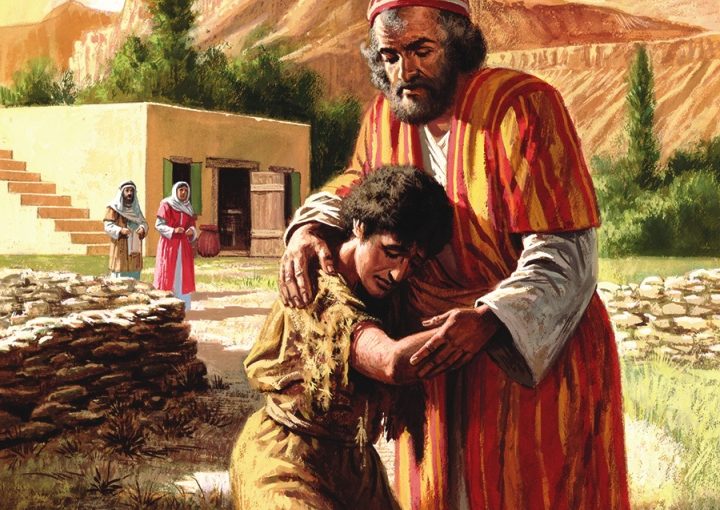Today’s reading is Luke 15:11-32, which is one of more popular parables in the Bible that Jesus told, “The Parable of the Lost Son.”
A man had two sons. The younger son approached his father and indicated that he wanted to receive his inheritance now. The younger son gathered his belongings, took his inheritance, and left home. As the story goes, the younger son “wasted his possessions on prodigal living.” The young son ended up destitute and broke. The son decided to return home, thinking he would offer to be a servant in his father’s home, as he would live a better life than he was now. Verse 20 says, “and when he was still a great way off, his father saw him and had compassion, and ran and fell on his neck and kissed him.” The father says in verse 22, “Bring out the best robe and put it on him and put a ring on the hand and sandals on his feet.” Verse 23 “And bring the fatted calf here and kill it and let us eat and be merry.”
Fast forward to the eldest son, who came home from the fields and observed “music and dancing.” The eldest son discovered his younger brother had returned home and the father was celebrating his return. The eldest son was furious and would not go into the party. Verse 29, the son addresses his father, “Lo, these many years I have been serving you; I never transgressed your commandment at any time; and yet you never gave me a young goat, that I might make merry with my friends.”
The father responded to the eldest son, verse 32, “It was right that we should make merry and be glad, for your brother was dead and is alive again, and was lost and is found.”
The focus of this parable generally focuses on the association that the father, is God the Father, and the lost son is us. No matter how great our sin, how lost we become, the Father will welcome us home with open arms. Great parable.
I want to focus on the resentment and anger of the eldest son. He was faithful to his father. He was loyal. He toiled in the fields and worked hard for his father. He stayed with the father and did what the father asked. When he saw the celebration for his younger brother, he was clearly angry and resentful. He made sure he told his father all of things he had done for him, and yet the father was celebrating the son who had sinned. The eldest son felt entitled.
In summary, both brothers were lost. The eldest brother felt righteous because of his loyalty to his father, very much like when we as Christians expect God’s favor when we follow Him.
I wrote a few weeks ago about our expectations and struggles with modern-day doubt and faith. A relationship with Jesus means we have faith that no matter what trials and tribulations we have, we believe there is a greater lesson, understanding, and good for us. We also must stay steadfast in our faith, even when things in our life go wrong. It is inevitable, life is difficult and we will be challenged. God is for us and not against us. We must have faith that no matter how difficult or awful the challenge, God has a plan for our life and is drawing us closer to Him.
Following God and being faithful does not mean that He “owes us.” Unfortunately, we may think the more faithful we are, the more life “should go our way.” We equate our faithfulness with the expectation that we will be rewarded for our goodness.
If we have an expectation for Jesus and His impact on our lives that is not based on the lessons and teachings in the Bible, we will always be disappointed and lack faith while we are on earth. If we think there’s no God because bad things happen, then we are setting an improper expectation that God never intended to meet. If we think there’s no God because life is uncomfortable and uncertain, then we are setting our own unrealistic expectation that will never be met. Faith is as much about the expectations we set and the benefits we expect to receive.
Fulfillment in our lives comes from the genuine connection and relationship we have with Christ. We accept the good times and persevere through the terrible times we don’t like or understand. This is certainly not easy. In fact, it seems impossible in those moments.
The last thing on my heart with this parable is that we as Christians need to set the right example for the people we want to bring to Christ. We must embrace the difficult times, stay devout, and live our lives in way that non-believers see us as different, in a positive way. We must live such that others want to discover what we have in our hearts that preserves us through tribulations. Let’s live for God, glorifying Him, be thankful for His blessings and favor, and expect nothing in return. Those same attributes carry over to be a kind and loving person on earth, while we are here. Even though we might be saved, we are not entitled to anything.






